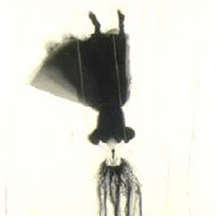 It has been a while since I've taken stock of my Top Design literary project: Margaret Russell's Observations. So I've decided to provide a little overview of the "works to date." I've also reprinted the text of the Introduction and the Commentary on Observations #1-3 that I posted previously.
It has been a while since I've taken stock of my Top Design literary project: Margaret Russell's Observations. So I've decided to provide a little overview of the "works to date." I've also reprinted the text of the Introduction and the Commentary on Observations #1-3 that I posted previously.I don't have any general narrative or thematic picture to offer, alas (I know you will be ever so disappointed, gentle reader). Since each week offers up a completely different set of circumstances, I never know what I'm going to use and so I have no plan in mind. It will be interesting (more likely, it won't) to see if the combined sensibilities of Margaret's comments and my fancy will end up producing some motif or sensibility that will make these various entries cohere. (Okay, the unfolding of this literary insight will be about as interesting as watching paint dry.) Stay tuned. (Or not. At any rate, it keeps me amused.)
Click on the titles to go to the individual OBSERVATIONS.
INTRODUCTION:
One of the main reasons for tuning in to Top Design is to hear what Margaret Russell is going to say. Therefore as regular feature I will be presenting some Margaret Russell's wit and wisdom under a selected edition I haved titled "Observations." The entries will be primarily comprised of epigraphs -- quotations taken from the show. However, I will use my editorial discretion to select the proper form: such as a poem, a koan, a simple statement of design principle, a theatrical note such as an ironic aside, or perhaps some mixed literary-philosophical genre.
OBSERVATION 1
The first week's was a light koan spoken in a more off-hand modern language.
OBSERVATION 2
The second week she again uses the terse declarative statement, but this time it is more poetic, moving into more of a haiku form: her repetition reinforced her characteristic irony, thus the second can be seen as a negation -- or question -- ofthe first. Repetition also insists on further reflection whereupon we might discover that something seemingly simple -- even silly -- may also plumb profound depths.
OBSERVATION 3
Margaret's literary stylings expanded this week in her celebratation of the seaside in southern France. She moved away from the statement form and her language became more associative. I think it was the southern French connection: perhaps she became possessed by the the spirit of the troubadours. Her simple questions -- romantic and almost child-like -- evoke the popular ballad form. The poem appears to be an aubade that celebrates the morning light.The aubade was popular with both the troubadors and as well as modernist poets such as Ezra Pound who greatly admired the troubadors. The second stanza's classic imagist style is very reminiscent of H.D. Indeed, her intense compaction and ironic undercurrent perfectly captures the spirit of the Americans in France a century ago. Can we read this as Margaret's preference for the modern over the of French country decor?
OBSERVATION #4
This is comprised of a series of three statements, each one a different type of address that moves from distance inward. The first is what we have come to know as her forte, i.e., the declarative statement (usually the pronouncement of a rule); the second is a more personal, conversational line addressed to "you"; and the third seems confessional and private as if spoken only to herself.
OBSERVATION #5
This observation was Margaret's challenge to Kelly, but really it is addressed to all of us. Margaret isn't just warning against being charmed by fakers who have nothing to back up their talk; she is demanding that we take art seriously. We must question its claims and explore its meanings. Art is where we engage with "big ideas."
OBSERVATION #6
This consists of four short poems that are typical "Margaretisms." I decided to break them into separate sections and add line breaks in order to emphasize the different ways that she uses language that can be seen as employing literary techniques:
- The first one is a list. What interested me was the richness of the language luxury as it builds up in her list of the extravagant celebrations of the super-rich. The language itself seems to participate in the enjoyment of excess.
- The second could be seen as using pacing and inflection to mimic meaning but mainly I just like the line.
- The third is syllabic (count'em).
- The last one, especially taken out of context, becomes is a wonderful pair of absurd contradictions -- like something out of Alice in Wonderland.
We return to the haiku: these two are in the classic seventeen syllable form.












1 comment:
You are hysterical. This post is fabulous. I love coming to this site and receiving my weekly surprise.
Post a Comment